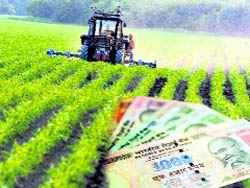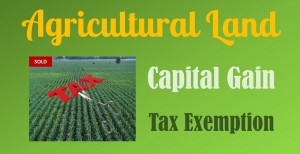In this blog post, Pramit Bhattacharya, a student of Damodaram Sanjivayya National Law University, writes about agricultural income and its tax treatment in India. The blog post highlights what conditions are necessary to be fulfilled while considering an income as an agricultural income and which source of income is considered as agricultural income. The blog post also touches upon the concept of taxation regarding the sale of agricultural land.
Under the Income Tax Act, 1961, income earned through agricultural activities is exempted from taxation. The reason for this exemption is that the Constitution has given the authority to the State Legislature to make laws with respect to taxes on agricultural income. However, while computing tax on non-agricultural income; agricultural income is also taken into consideration. Income from agricultural operations is exempted under Section 10 (1) of the Income Tax Act, 1961. Agricultural Income is defined under Section 2 (1A) of the Act.
What is Agricultural Income?
Under Sec 2(1A) of the Income Tax Act, agricultural income means-
- Any land which is situated in India and is used for the purpose of agriculture.
- Any income derived from such land by the way of doing agriculture on that land.
- Any income which is derived from such land including processing of the agricultural produce raised or received as rent in kind or any process which has been used by the cultivator or received as rent in kind so as to render the produce fit for market or sale.
- Any land which is owned and occupied by the assessee from which the assessee derives any income receives any rent or derives any revenue when the land is employed in agricultural activities. The building should be on the agricultural land or should be in the vicinity of the land. The building should also be used by the assessee as an out-house, dwelling house or a store-house.
Considering the above conditions, income generated through a farmhouse will be considered as agricultural income. Income derived from seeds and sapling grown in a nursery is also considered as agricultural income.[1]
Conditions for income to be considered as agricultural income
- The existence of land, i.e. there should be a land.
- The land should be used for Agricultural Purposes – agricultural operations or purposes means effort induced to grow crop out of the land in use. Both rent and revenue derived from such land are exempted from taxation. Though such agricultural land may attract some land revenue taxes or be subjected to local rates. There should be a direct link between the incomes derived from the land used for agricultural purposes. For example, rent received by a landlord for a piece of land used for agricultural activities is exempted from tax.
- Cultivation of the Land is a must – some level of cultivation on the land is necessary for it to be considered to be used for agricultural purposes. Agriculture includes in its purview production of fruits, grains, tea plantations, commercial crops, grasslands, and groves. But the usage of land for dairy farming, rearing of livestock, poultry farming wouldn’t make the land count as an agricultural land.
- Ownership of Property is not Necessary – It is essential that the assessee who receives any rent or revenue from the land has some vested interest to be eligible for tax-free income, but it is not necessary that the person who is carrying out agricultural activities is the owner of the land. For example, a tenant of the land who uses it for agricultural purposes will enjoy exemption from tax. Also, in some cases, carrying out some further processes on the agricultural produce is necessary to make it fit as a marketable commodity or for sale. The sale proceeds of such products are also considered agricultural income.
Exceptions
- If the product is sold without carrying out any agricultural or processing activity, then the income derived from such sale wouldn’t be considered agricultural income.
- In a case when extensive processing is done with the product which changes the nature of the product entirely, the whole of the operation wouldn’t be considered as agricultural income. For example, canning of fruits. In such cases the income generated will have to be divided into two parts, one which will be agricultural income and the other part will be some other income, as in canning of fruits, it’ll be considered as business income.
- If trees are cut and sold as timber, it’ll not be considered as agricultural income. This is because there was no active agricultural process like soil treatment and cultivation.[2]
Certain Incomes which are treated as Agricultural Income
- Rent received from agricultural land.
- Income from sale of “replanted” trees.
- Income from growing creepers and flowers.
- Income from sale of seeds.
- When a firm is engaged in agricultural activities and theassessee has a share of profit in it.
- If any interest is received on capital from a firm engaged in agricultural activities.
Incomes which are not treated as Agricultural Income
- Income from bee hiving.
- Income from poultry farming.
- Income from sale of trees which are grown spontaneously.
- Income generated from dairy farming.
- Purchasing standing crop which has not been subjected to any processing.
- Dividend paid by a company which is engaged in agricultural activities.
- Income from cheese and butter making.
- Income from Plantation companies. [Many plantation companies these days come out with schemes which offer tax-free income to the investors. The schemes are of various types. Some investors are given leasehold rights to the land, some are given rent, and some are given rights to the trees on the land. If the scheme gives leasehold rights to the investor, then the income he would receive will be considered as rent or revenue. If there are no leasehold or ownership rights, the income received will be considered either as interest or non-agricultural income which will attract tax.]
Tax on Sale of Agricultural Land
Before the year 1970, if any profit was earned by selling or transfer of agricultural property, it was considered to be generated from agricultural land and hence such proceeds were exempted from taxation. The Courts also supported this proposition. But through a retrospective amendment, this position was changed from April 1970. After the amendment, a land was considered an agricultural land if it was not situated in an area which came under the jurisdiction of a municipality or a cantonment board, and the population of that area was not more than 10,000 or more according to the last census count which has been published before the first day of the previous year in which the sale of land has taken place. Also, the land is not situated less than eight kilometers from the local limits of any municipality or a cantonment board.
Any land which qualifies the above-mentioned test is not to be considered as a part of the capital assets, and there can be no capital gains on the sale of such land. Any agricultural land which does not satisfy the above test will be considered a capital asset and proceeds from the sale of such land will be considered as a capital asset and will be subject to capital gains tax, subject to some conditions provided under Section 54B of the Income Tax Act.
Section 54B states that if any capital gain accrues on the sale or transfer of agricultural land, then it is not to chargeas taxable income in certain cases.[5]
- The assessee should be a Hindu Undivided Family (HUF) or an individual.
- The asset may be a long term asset or short term asset, but it should have been used for agricultural purposes.
- The land should have been used by the assessee or his parents for at least two years immediately preceding the date on which the transfer or the sale of the land took place.
- The assessee should purchase a new piece of land for agricultural purposes within two years from the sale of the former agricultural land.
- The whole amount which he gained by the sale of the former piece of land should be utilized to buy the new property.
- The new asset which has been purchased shouldn’t be sold within the period of three years from the date of acquiring it. If the new asset is sold, the cost of the new asset will be reduced by the amount of capital gain which the assessee claimed under Sec 54B for the purposes of computing capital gains.
- If the amount of capital gains secured from the sale of the previous asset is not utilized by the assessee for the purchase of new asset before furnishing the tax returns, he may deposit the said amount in Capital Gains Account Scheme with any of the specified banks.
How Agricultural Income is taxed after amendment by Finance (No. 2) Act, 2014?
Agricultural income will be considered while computing the income tax of a person if the following conditions are satisfied-
- Net income from agricultural exceeds Rs. 5, 000 for the previous year, and
- Total income, including agricultural income, exceeds the basic exemption limit.
This method is used to levy tax on agricultural income in an indirect way. This concept is also known as the partial integration of taxes.
There is a lot of scope for taxing income which accrues from activities which are non-agricultural in nature. In many cases, agriculturalists do not have any taxable income. This is due to the fact that when the money from agricultural income is divided among the family members, it falls within the exemption limit in any case. However, many middlemen like distributors, wholesellers, retailers, etc. earn substantial income and claim exemption in the name of agricultural income. These earnings and profits are technically taxable, but due to the loopholes, they are not taxed. If intensive efforts are made by the Tax Department to recover tax from them the need for widening the tax base, to include these people will be eliminated
Footnotes:
[1]http://taxguru.in/income-tax/income-tax-treatment-taxability-of-agricultural-income.html
[2]T. Padma, Dr., “Principle of Law of Taxation”, ALT Publication, 10th Edition
[3]https://indiantaxguide.wordpress.com/2009/05/08/agricultural-income/
[4] Ibid.
[5]http://www.lawctopus.com/academike/agricultural-income/#_edn8
 Serato DJ Crack 2025Serato DJ PRO Crack
Serato DJ Crack 2025Serato DJ PRO Crack












 Allow notifications
Allow notifications


